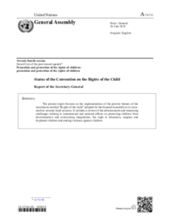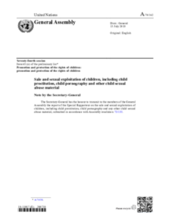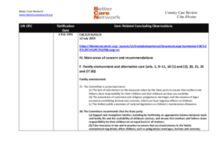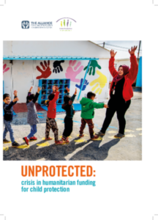Displaying 331 - 340 of 1796
In its resolution 73/155, the General Assembly requested the Secretary-General to submit to it at its seventy-fourth session a comprehensive report on the rights of the child containing information on the status of the Convention on the Rights of the Child, with a focus on children without parental care.
This article compares and contrasts the services needed by families in child welfare systems with the services that families receive.
The purpose of this article is to address at a broad level the issue of how overarching concepts of child protection and Islam influence social work practice with Muslim communities.
In the present report, the UN Special Rapporteur on the sale and sexual exploitation of children, including child prostitution, child pornography and other child sexual abuse material, describes the activities undertaken in relation to the discharge of her mandate since her previous report to the United Nations General Assembly. The report presents a thematic study on safeguards for the protection of the rights of children born from surrogacy arrangements, highlighting the rights of the child to identity, access to origins and to a family environment.
This country care review includes the care-related Concluding Observations adopted by the Committee on the Rights of the Child.
This paper reviews and contributes to evolving analyses of the public health, legal, and ethical consequences of immigration policy.
This desk review provides a picture of funding for the child protection sector over the period 2010–2018.
The objective of this study was to distinguish Child Protection Services (CPS) subgroups based on risk and protective factors to enable tailor made case management that fits the specific needs of these subgroups.
This review examines the legislative history leading up to extended care, the research on youth leaving foster care, youth preferences for extended care, the competition of extended care with permanency options, and the effects of extended foster care on transition-age youth.
In this chapter of Filiation and the Protection of Parentless Children, the author shows the ways in which premodern Muslim jurists and judges (with focus on early modern Egypt) were able to circumvent the prohibition of adoption through discursive moves and practices, which helped create a family life for many parentless and non-biological children.




